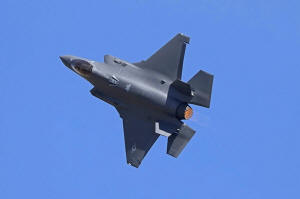Europe and Canada are eyeing alternatives to American-made fighter jets.
Here's why
[March 19, 2025] By
STEFANIE DAZIO and TARA COPP
BERLIN (AP) — Questions are mounting in Canada and in Europe over
whether big-ticket purchases of high-end U.S. weaponry, such as the F-35
Joint Strike Fighter, are still a wise strategic choice for Western
countries worried about their investment in U.S. defense technology.
In less than two months, U.S. President Donald Trump has upended decades
of foreign policy. He has left NATO members questioning whether
Washington will honor the trans-Atlantic alliance's commitment to defend
each other, if other European countries are attacked by Russia. He's
also made repeat overtures to Moscow and suspended most U.S. foreign
aid.
That could impact foreign sales of the Lockheed Martin-produced F-35 and
other advanced U.S. jets like the F-16. As Russia's war in Ukraine
grinds on, it's become clear that Eastern European NATO members still
have vast stores of Soviet-era weapons in their stockpiles that weren't
interoperable with Western weaponry.
A long-term plan to get all of NATO on similar platforms — by replacing
old Soviet-era jets with Western ones, particularly the F-16 and in some
cases, the F-35 — has gained momentum.
Some of the NATO countries are now rethinking tying their defense to
U.S.-made systems and potentially considering European jets.
Angering an F-35 partner
In Canada, where Trump has launched a trade war and has threatened
economic coercion to make it the 51st American state, new Prime Minister
Mark Carney has asked Defense Minister Bill Blair to review its purchase
of F-35s. Canada has been a partner with the U.S. in developing the
fighter.
Blair will see if there are other options “given the changing
environment,” a defense spokesman said.

Carney on Tuesday announced an early warning radar system purchase from
Australia worth Canadian $6 billion ($4.2 billion). Officials say it
will have a smaller footprint than a similar American system.
And in Portugal, the outgoing defense minister recently told a
Portuguese newspaper that “recent positions” taken by Washington
compelled a rethink about the purchase of F-35s. Portugal is considering
various options to replace its F-16s.
“You’re not just buying an airplane, you’re buying a relationship with
the United States,” said Winslow T. Wheeler, who spent three decades in
U.S. Congress working for Democrats and Republicans on national security
and defense issues. “People in the past have not just welcomed, but
craved that kind of relationship.”
The Netherlands and Norway, on the other hand, have recently voiced
support for the F-35 program.
The F-35 and a ‘kill switch’
The F-35 Joint Strike Fighter was designed to combine stealth,
maneuverability and attack capabilities in a single aircraft. Each jet
costs about $85 million (78 million euros), and the price jumps to as
high as $150 million (137 million euros) when supporting infrastructure
and spare parts are included.
About 1,100 have been produced to date for 16 military services across
the globe.
The F-35B, a variant that can take off from ship decks vertically, is
the latest model. It's the most expensive weapons system the U.S. has
ever produced, with estimated lifetime costs now expected to top $1.7
trillion. One of the ways the program was counting on reducing those
costs was by selling more aircraft to international customers.
But the Trump administration's recent stance on the Russia-Ukraine war
has fueled fears that Washington may have similar ways to coerce buyers
in a future fight — such as by embedding a hypothetical “kill switch” in
the F-35's millions of lines of programming.

[to top of second column] |

U.S. Air Force fighter aircraft F-35 performs aerobatic
maneuvers on the third day of the Aero India 2025, a biennial event,
at Yelahanka air base in Bengaluru, India, Wednesday, Feb. 12, 2025.
(AP Photo/Aijaz Rahi, File)
 The Pentagon's F-35 Lightning II
Joint Program Office, however, vehemently rejected that notion.
“There is no kill switch," the office said in a statement on
Tuesday. “We remain committed to providing all users with the full
functionality and support they require.”
But that's not the only way to impact an ally's program, Wheeler
said. The F-35 requires constant U.S.-controlled tech upgrades to
operate in combat. If a relationship with the U.S. soured and
updates were delayed, it could make a jet, or even a fleet,
inoperable, he said.
Lockheed Martin said in a statement on Tuesday that the defense
contractor delivers “all system infrastructure and data required for
all F-35 customers to sustain the aircraft.”
European jet alternatives
The Saab Gripen, Eurofighter Typhoon and Dassault Rafale could see
an increase in sales if other countries decide to forgo their F-35
purchases. But none of them have the F-35's stealth capabilities.
The Swedish-made Saab Gripen is used by the militaries of Sweden,
the Czech Republic, Hungary, South Africa,Brazil and Thailand.
Conventional defense industry wisdom says it's significantly cheaper
than the F-35, Wheeler said.
The Eurofighter Typhoon, part of the British, German, Spanish and
Italian forces, is manufactured by a consortium of defense
companies: Airbus, BAE Systems and Leonardo.
The French-built Dassault Rafale twin-jet fighter is used by some
branches of France's armed forces. The governments of Egypt, India,
Qatar, Greece, Croatia, the United Arab Emirates, Serbia and
Indonesia have all signed contracts for Rafales.
David Jordan, a senior lecturer in defense studies at King’s College
London and co-director of the Freeman Air and Space Institute, said
that previously, European leaders felt it was easier and more
cost-effective to lean on the U.S. defense industry to get access to
advanced weaponry.
But the Trump administration's move away from Europe could be the
turning point, Jordan said.
It would require the continent to pool its money and resources —
often a sticking point among the countries — into research and
development, manufacturing and logistics.
But “the European defense industry is more than capable of building
what it needs” within a decade, Jordan said.

French President Emmanuel Macron is already ramping up his efforts
to persuade allies to switch to European defense contractors and
weapons systems, including being offered Rafale fighters over F-35s.
If the Europeans increase their production, it would greatly affect
the bottom lines of Lockheed Martin and other U.S. defense
companies. Jordan said that U.S. defense contractors are likely
concerned about Trump’s next move.
“At what point will they say ‘we don’t like this, we’re talking
about risking billions of dollars here,’” Jordan said.
The White House didn't respond to a request for comment on Tuesday.
___
Tara Copp reported from Washington. John Leicester in Paris, and
Jill Lawless and Danica Kirka in London, contributed to this report.
All contents © copyright 2025 Associated Press. All rights reserved |